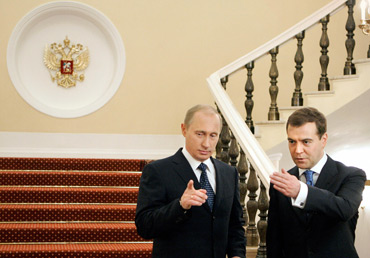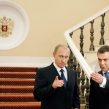
Putin’s “Modernization” Avoids Reforming Political Institutions
Publication: Eurasia Daily Monitor Volume: 8 Issue: 78
By:

In an annual government report to the Duma on April 20 that lasted together with the Q&A more than four hours, Prime Minister Vladimir Putin outlined his economic and political agenda for the long-term future – at least until 2020. This was Putin’s third annual report to parliament. Unlike previous Russian prime ministers Putin does not appear at Duma sessions, while summoning selected deputies and faction leaders from time to time for meetings in his Moscow office or in out of town residencies. The main message of the report: Putin is determined to tightly control Russia for at least ten more years and will not allow any liberal political or economic “experiments” (https://premier.gov.ru, April 20).
Putin began his address by praising his government for successfully guiding Russia through the world financial and economic crisis and putting it on a path of successful and sustainable growth. Putin mentioned nations that are still in turmoil (Portugal, Greece, Poland and the Baltic States), concluding: “The main lesson is that political and economic weakness leads to loss of national sovereignty,” with outsiders arriving and giving advice “that may sound good, but is in fact a rough diktat and infringement of internal sovereign affairs.” According to Putin, all Duma factions are united in the need to oppose this foreign threat.
Putin insisted that Russia needs “ten years of sustained and calm development without any unneeded liberal experiments or social demagogy.” Putin is obviously bidding for practically endless political, financial and economic power in Russia. Putin promised “modernization” that is essentially a technological innovation of Russian industry (primarily – defense and dual-use) and an upgrading of the nations’ basic infrastructure without any significant change in its institutions. According to Putin, the best guarantee against any social and civil disorder is “for the people to see we are working to defend their interests and are increasing their benefits and there will be no problems.” Putin compared opposition political activists with harmful germs that “are present even in a healthy organism” and “if we weaken our immunity, we will immediately catch some kind of influenza, but if we maintain our social-political immunity, no quasi-political influenza will appear” (https://premier.gov.ru, April 20).
Putin spelled out plans to boost police and military pay, to increase handouts to pensioners, doctors, teachers and other public employees that are seen as the most easily controllable part of the populace. To Russia’s rich Putin promised to use tariffs and quotas to protect the internal market to keep foreign industrial and agricultural produce out, while building a selective customs and economical union with Belarus, Kazakhstan and other former Soviet republics that may join. Putin promised foreign corporations a share of the Russian market if they import know how, investment and technologies to produce in Russia. Putin promised trillions of rubles to buy new weapons and to renovate the Russian defense industry: “Some technologies and weapons may be procured abroad,” but foreigners “will not sell us the newest weapons.” Putin believes the Russian defense budget must not be “spent abroad,” but used “to create jobs and develop new technologies in Russia.” The present high world energy prices will help pay for it all: the social handouts, and subsidies for agriculture and industrial development (https://premier.gov.ru, April 20).
Putin’s vision for Russia’s future seems to be a combination of paternalism, social demagogy, protectionism, nationalism and militarism – worthy of some Third World dictator of the mid-twentieth century, like Juan Domingo Perón of Argentina. But it also surely has a typical Russian flavor: in the traditions of Tsar Peter the Great and the communist dictator Josef Stalin, Putin believes in massive imports of Western know how and technologies to make Russia by 2020 “one of the five most developed world powers,” while excluding Western democratic institutions and Western values. Putin talked about the need to launch “a new wave of industrial and technological development” – in line with Stalin’s key “industrialization” that turned the Soviet Union into a world superpower. Of course, Stalin in turn promoted Peter the Great as a “progressive tsar,” for modernizing and industrializing Russia in the eighteenth century.
Supporters of Dmitry Medvedev from the Presidential Council on Human Rights have recently endorsed a program of “de-Stalinization” (Interfax, March 30). Putin was asked in the Duma about the possible “de-Stalinization” by the Communist leader Gennady Zuganov, but declined to comment. At the same time Putin cracked a Stalinist-era joke while answering a question about possible Internet censorship: “I cannot recall there was any Internet in 1937 [the height of Stalinist terror], but there was a joke at the time – the Tse-Ka [Central Communist Party Committee] warns, while the Che-Ka [KGB] cuts [throats].” Putin, a former KGB officer, continued “we do not intend to ‘cut’ anything,” adding “in my personal opinion it is not possible to restrict anything.” This was interpreted as “Putin rules out restrictions on the Internet” (RIA Novosti, April 20). In fact, Putin said that the Internet is controlled by the US and “the special services are concerned that it may be used against the interests of the Russian state and society” (https://premier.gov.ru, April 20). It is a seasoned Stalinist tactical trick by Russian rulers to pretend that they personally are liberal, but the “special services” [KGB] have “concerns” that must be accommodated. Putin seems to have stressed that he supported an unrestricted Internet not as Prime Minister or leader of the ruling United Russia party, but as a private individual.
Medvedev blogs and tweets, however Putin does neither. In line with the present Kremlin political agenda, Medvedev’s economic aide Arkadiy Dvorkovich told journalists that Russian modernization “involves more that Putin’s Duma address,” including “the modernization of institutions and state practices” (Interfax, April 20). But in his public performance in the Duma for more than four hours spelling out Russia’s long-term future Putin did not mention Medvedev, who is his nominal boss, not even a single time. Maybe, according to Putin, Medvedev does not have any part in that future.




